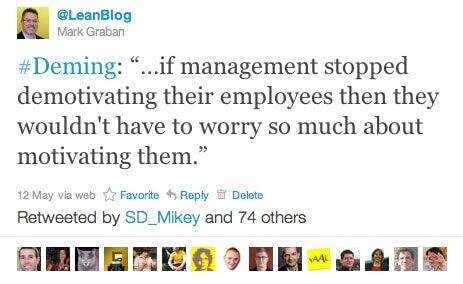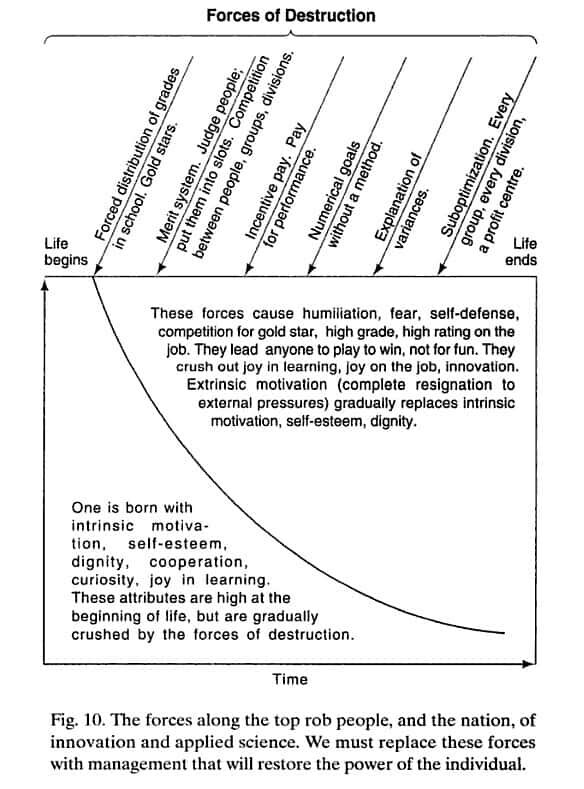I'm always happy when the wisdom of Dr. W. Edwards Deming spreads in modern social media, almost 20 years after his passing. His message is timeless and it always seems to resonate with people. In my life, education, and career, I was exposed to his teachings before I even got deeply involved with studying Lean.
I recently tweeted the following that I believe is just a paraphrase of Deming's thoughts, or I saw it in a YouTube video of him:
“…if management stopped demotivating their employees then they wouldn't have to worry so much about motivating them.”
As you can see in the screengrab from Twitter, below, it was “re-tweeted” over 73 times, which shows the message really spread somewhat virally. I hope it made people stop and think.
Why Your Employees Are Losing Motivation by David Sirota, Louis A. Mischkind, and Michael Irwin Meltzer from the Harvard Management Update:
“Most companies have it all wrong. They don't have to motivate their employees. They have to stop demotivating them.”
Deming talked about “nurturing” intrinsic motivation (see the video, below), but it seems to be that he thought you can't restore people to their initial motivation levels once it has been “crushed” out of them.
Updated: The quote I tweeted is actually from the Harry Neave book The Deming Dimension on page 200 (via Google Books).
Modern tweet embed (Edit from 2017):
(As it looked when it was originally posted):

But enough of the Twitter talk…. we can have a deeper discussion of this idea here in the blog comments.
On page 121 of his book The New Economics for Industry, Government, Education (now available on Kindle!), he writes:
Effects of the present style of reward. The accompanying diagram (below) shows some of the forces of destruction that come from the present style of reward, and their effects. what they do is to squeeze out from an individual, over his lifetime, his innate intrinsic motivation, self-esteem, dignity. They build into him fear, self-defense, extrinsic motivation. We have been destroying our people, from toddlers on through the university, and on the job. We must preserve the power of intrinsic motivation, dignity, cooperation, curiosity, joy in learning, that people are born with.
The illustration shows that motivation can only go DOWN in current management structures. We must maintain people's intrinsic motivation.

The “forces of destruction” going across the top from left to right are:
- Forced distribution of grades in school. Gold stars.
- Merit system. Judge people; put them into slots. Competition between people, groups, divisions.
- Incentive pay. Pay for performance.
- Numerical goals without a method.
- Explanation of variances.
- Suboptimization. Every group, every division, a profit center.
As Dr. Deming taught, “extrinsic motivation gradually replaces intrinsic motivation, self-esteem, dignity. Here is a video of Dr. Deming speaking on this subject. He says he wants to “mourn” the intrinsic motivation and dignity, and other attributes that are “high at the beginning of life” but are “gradually crushed out, year by year, throughout life.” Dr. Deming certainly seemed to be a very intrinsically motivated man, to continue working and teaching into his early 90s.
Deming says:
“We can't just remodel the prison [of current management practices]…. we have to get out of it.”
It's my lucky early exposure to Dr. Deming that makes the work of writers like Daniel Pink, Alfie Kohn, and Samuel Culbert. Check out my podcasts with these three guests (and help me test-drive the design of a new podcast-specific site that the content will live on):
- #117: Samuel Culbert: Get Rid of the Performance Review!
- #107: Dan Pink: Lean and “Drive”
- #57: Alfie Kohn: “Punished by Rewards”
It's easier to diagnose that people get demotivated over time. Think of a person in your workplace who is considered to have a “bad attitude.” Do you think they started their career or their job at that point? If so, why were they ever hired? You needed just “any warm body?” Well, that's disrespectful, isn't it? What do you think happened to turn the “live trees” you hired into “dead wood” as Peter Scholtes said?
Does the waste and frustration in people's workplaces turn into accumulated demotivation? When employees aren't listened to by managers, that's demotivating. When people don't have the tools and systems required to do their best work, that's motivating.
All of the prizes, bonuses, and workplace rewards and perks in the world can't fix that motivation. It always troubles me when I see the “Best Places to Work” lists articles so dominated by bullet points about the great perks that companies offer. Can free cubicle neck rubs from a trained masseuse really make up for otherwise toxic workplace? I think not.
Instead of headlines about perks being “epic” at a given company, I'd love to see headlines about how it's “epic” that everybody is treated with respect in our workplace!
Please scroll down (or click) to post a comment. Connect with me on LinkedIn.
Let’s work together to build a culture of continuous improvement and psychological safety. If you're a leader looking to create lasting change—not just projects—I help organizations:
- Engage people at all levels in sustainable improvement
- Shift from fear of mistakes to learning from them
- Apply Lean thinking in practical, people-centered ways
Interested in coaching or a keynote talk? Let’s start a conversation.











Wow, my organization practices the last 4 arrows with intensity and wonders why employee engagement scores don’t improve!
Another meme that will spread in social media is Eric Ries’ mention of Deming:
“the customer is the most important part of the
manufacturingproduction line”in the context of “lean startups”:
http://www.sllconf.com
and watch live:
http://www.justin.tv/startuplessonslearned
Mark,
The correct quote is, “The customer is the most important part of the production line.” W.E. Deming
Regards,
Fernando J. Grijalva
@demingsos
Thanks for the correction.
Isn’t it amazing how apparently timeless what Deming had to say is? I always scoff at the notion that “we’ve done Deming”. I think we all could stand to go back and try to learn from what he really had to say. Collectively, we still haven’t “heard” him. I’d go as far to say that anyone championing Lean who doesn’t study Deming that they are missing a HUGE, essential part of the holistic view. Deming doesn’t hand you a tool kit, he makes you THINK about the realationships between workers and their work/environment.
I agree Mark, you hear a lot of Deming in what Dan Pink and Alfie Kohn have to say (I haven’t read enough of Culbert to make a judgement). Your Twitter response may signal that perhaps the time has come when we are ready to actually listen to Deming. Dust off your red bead experiments!
This post made my day (I think I was just extrinsically motivated, but I’ll take what I can get).
Mark,
You write, “I recently tweeted the following that I believe is just a paraphrase of Deming’s thoughts, or I saw it in a YouTube video of him:
“…if management stopped demotivating their employees then they wouldn’t have to worry so much about motivating them.””
I tweeted that quote a few months ago. I found it in Henry Neave’s book “The Deming Dimension”
Regards,
Fernando J. Grijalva
@demingsos
Thanks. Yes, it’s page 200 of the Neaves book:
http://books.google.com/books?ei=qtDaTZb6EKfZ0QGznan9Aw&ct=book-thumbnail&id=Nf_sAAAAMAAJ&dq=deming+dimension&q=stopped+demotivating#search_anchor
The Forces of Destruction Chart is soooooooo dead on target. It could be part of a textbook on the psychology of motivation. Thanks for putting it out for us to see.
I am in total agreement with the statement that employers need to stop demotivating employees. I have seen this kind of leadership behavior in the many different jobs I have had.
I want to know how do we help put this into practice.
What is the root cause for why leaders continue to behave in ways that the “prison” walls remain standing? Here are a few I can think of:
1. They don’t know differently – Many leaders were good or the best at producing something then were promoted to leadership without training in leadership skill sets. Most leaders only get developed by their leader so the master/apprentice model does not always leave room for other ideas.
2. It seems too idealistic to people. Many believe the reality of working life does not let something like this ideal work.
3. Attitudes towards employees. I love how Scholtes suggests to “Question Your Assumptions About People…For instance, do you believe that people cannot be trusted? That they don’t want to do a good job? That as a manager you must ‘motivate’ (i.e. bribe or threaten) them?” http://pscholtes.com/articles/leaders96.cfm
4. Leaders haven’t tried it or experienced it for themselves.
5. Fear of loss of authority.
6. Many years of conditioning that this is normal.
For each root cause, there are a lot of counter-measures to try here. I firmly belive it is a goal worth pursuing though.
Great thoughts, Brian. In most instances where we find a “bad manager,” we can certainly exercise our lean problem solving skills to ask “why?” and look for systemic root causes…
Most managers assume that extrinsic motivation has a fair greater influence than it really has. For any job that requires some degree of expertise, complexity of communication, or creativity in problem solving, intrinsic motivation is the most significant influence over performance. Extrinsic motivation can play a significant role in some tasks (I think Daniel Pink described envelop stuffing as an example) but rarely is significant in the overall scope of jobs… even those jobs that we might assume to be “simple” or menial.
During my MBA I did a paper on Pay for Performance (P4P)… the research favoring P4P was outnumbered by those criticizing it on about a 1:20 basis (favor P4P: critical of P4P)… and I don’t think anything has changed over the past decade.
As a former collegue would say, “manager’s have the right to manage poorly”… but correcting the assumption that extrinsic motivation is a significant aspect of overall motivation and performance should be a priority for organizations.
The solution is to focus on those intrinsic motivation factors that management can influence such as engaging employees in the overall purpose of the organization and how that employee’s role contributes to it, helping employees pursue mastery within their role, and supporting employees to be autonomous in their decision making, particulary giving them control over their workload and work/life balance. And as the above article states, management needs to avoid making decision that demotivate the employee.
I did my MBA paper on witchhunting and cover-ups in the workplace :) I tend to view most bureaucracies as pathological.
You manufacturing and health-lean types have it easy – only sick people and inventory bottlenecks.
As the good Doctor in Star Trek might have said about bureaucracies “It’s worse than that Jim…”
And this is where I struggle – I can accept respect for front-line workers as a core part of Lean even though you do get the odd ‘dud’ employee who really shouldn’t be there or has significant personal problems they are exposing at work.
What I struggle with though, is the highly-paid, highly-educated duds who find their way to senior ranks. And they elicit an emotional response that makes sticking to a rational, problem solving response difficult.
I had one a few days ago who caused me to nearly lose my cool. She went on and on about how special she was, her division was and how the rest of the organisation could jump in the lake.
Mark’s blog is very therapeutic – a place for us to cool off.
[…] If management stopped demotivating their employees… by Mark Graban – “Think of a person in your workplace who is considered to have a “bad attitude.” Do you think they started their career or their job at that point? If so, why were they ever hired? … What do you think happened to turn the “live trees” you hired into “dead wood” as Peter Scholtes said?“ […]
Mark, could you give the source for the diagram, please?
Like it says in the post, page 121 of Deming’s “Out of the Crisis.”
Great post. Keep up the great work.
[…] employees, as they can only hope to not demotivate them. I wrote about this in my post ”If management stopped demotivating their employees…“ Deming had a chart that showed how an employee’s intrinsic motivation would only go […]
Deming, Scholtes and Pink seem to be all on the same page regarding intrinsic motivation versus extrinsic motivation. Those commenting and many in the lean community are on board as well. Has anyone seen or heard of these ideas being discussed or promoted in the HR community? The postings that I see in LinkedIn from HR people are still touting some new and improved performance review format and the latest fad of automating reviews. Yes, the C Suite needs to be breached with these ideas, but the supporting bulwarks of HR systems reinforce this approach and they are formidable. How do we start the conversation with the HR community?
We start one HR leader at a time?
Yes, that is a starting point. I have always believed that this focus is key. It is foundational. We promote a process and system focus, yet we retain an antiquated stick and carrot approach for individuals that is highly refined and entrenched and one that can undermine what we are trying to accomplish from an awareness and behavior standpoint. As has been pointed out in the comments, this can lead to among other things sub-optimization. Another effect of pitting individuals against each other is that it undermines teamwork and transfer of knowledge. This is what can happen and I have heard stories of something to this effect. A new engineer arrives in a department and is assigned to an area where an older associate without a degree is to help train him. He tells the new hire the following: Why should I give you knowledge that you will use to surpass me in a performance review? He knows that the company has a system of assigning pay raise grades and giving promotions based on a bell curve. The effect is that much know-how is retained and not shared.
A more recent share got a great response on Twitter:
And the LinkedIn discussion: